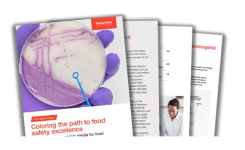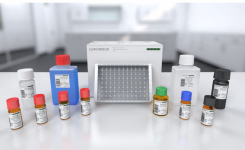bioMerieux Launches VIDAS® EBV, New Test for Infectious Mononucleosis
go back to news archives| | bioMerieux has launched the VIDAS® EBV for the detection of the Epstein-Barr virus (EBV). This virus causes 80% of cases of infectious mononucleosis, which is often known as 'the kissing disease' because it is transmitted through saliva. Infectious mononucleosis (IM) causes significant fatigue that can last for several months. The new test is especially useful for doctors, since IM symptoms are similar to those of other diseases that are infectious (strep throat, toxoplasmosis, rubella, etc.) or non-infectious. |
VIDAS EBV helps to avoid the inappropriate use of antibiotics. Diagnosis also enables doctors to advise their patients on curtailing contact sports or avoiding alcohol and certain medications to prevent rare but serious complications. Developed by bioMerieux, this new test, based on proprietary technology, comprises a panel of three markers1 that must be used together to detect specific antibodies and determine the stage of infection. The test was developed on the automated VIDAS system, widely recognized for its robustness and reliability. VIDAS EBV has received CE approval and provides rapid results in 40 minutes. It is a valuable addition to the tests already available on the VIDAS platform for the detection of toxoplasmosis and cytomegalovirus infections, two diseases that cause the same symptoms as the Epstein-Barr virus. 'This is yet another example of bioMerieux R&D's capacity for innovation,' said Stephane Bancel, bioMerieux Chief Executive Officer. Infectious mononucleosis occurs frequently and requires accurate diagnosis. With 23,000 VIDAS and mini VIDAS systems installed in customer labs, this innovative test will be widely available to doctors throughout the world.' Infectious mononucleosis primarily affects adolescents. According to the CDC2, over 40% of young people aged 10 to 19 have been infected with the Epstein-Barr virus. The virus is transmitted through saliva. After an incubation period of two to seven weeks, patients may be contagious for 18 months. References: 1. Testing for VCA IgM antibodies to detect recent infections, testing for VCA/EA IgG antibodies, and testing for EBNA IgG antibodies to detect past infections. 2. CDC: The U.S. Centers for Disease Control and Prevention in Atlanta, Georgia. Find out more about VIDAS® EBV visit: www.biomerieux-diagnostics.com/vidasebv |
NOTE: This item is from our 'historic' database and
may contain information which is not up to date.
Source : bioMerieux (clinical diagnostic applications) View Company Information
Posted on July 1, 2009
















